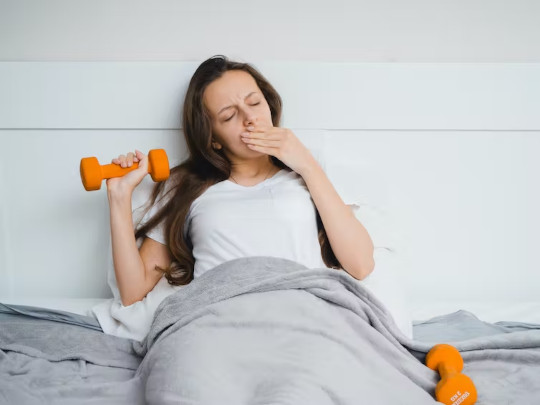
Getting enough good sleep each night can have benefits for your fitness. Evgeny Hmur/ Shutterstock
When we think of what makes athletes great, few of us would think that sleep might play an important role. But many of the world’s best athletes say sleep is an essential part of their training routine and key in helping them to perform well.
Serena Williams, for example, strives to get eight hours of sleep each night. NBA star LeBron James aims for eight to ten hours per night, while NFL legend Tom Brady says he goes to bed early and gets at least nine hours of sleep.
It’s no wonder, since sleep plays a key role in metabolism, the growth and repair of tissues (such as our muscles), and ensures memory, reaction time and decision making are all working optimally. All these processes impact sporting performance.
But it isn’t just athletes whose athletic performance can benefit from proper sleep. Even amateur gym-goers can maximise the benefits of exercise for their fitness and health by getting enough good sleep each night.
Get The Latest By Email
Here are just some of the ways sleep benefits your fitness:
Aerobic fitness
Exercise is great for improving aerobic fitness. It improves both aerobic capacity (being able to run or cycle faster with a heavier load) and efficiency (meaning your body requires less oxygen to run or cycle at the same pace).
One contributing factor to improved aerobic fitness is the function of the body’s mitochondria. Mitochondria are small structures within the cells of the muscles that are responsible for creating the energy the muscle requires during exercise.
Research shows that poor sleep (getting only four hours a night for five nights) can reduce the function of mitochondria in healthy participants. High-intensity interval training was shown to alleviate these impairments in the short-term (over a five-day period). But, it’s currently unclear how these impairments would influence adaptations to exercise in the longer term, so it’s best to get a good night’s sleep if improving aerobic fitness is one of your goals.
Muscle growth
Sleep is also important if you’re looking to build strength or muscle.
Muscle growth occurs when new proteins are added to the muscle structure – a process known as “muscle protein synthesis”. This process is stimulated by exercise and food (specifically protein) intake, and can last at least 24 hours after a workout.
Research shows that even just a few nights of insufficient sleep reduces the muscle protein synthesis response to nutrient intake. This suggests that poor sleep may make it harder for the body to build muscle.
Anabolic hormones
Hormones act as chemical messengers that contribute to a range of functions throughout the body, such growth and development of tissues. Hormones which are involved with these building processes can be termed “anabolic” hormones.
Two anabolic hormones – testosterone and growth hormone, which are released during sleep – may also be important for recovery from and adaptation to exercise. These hormones have multiple roles in the body, and are linked to improved body composition (lower body fat and higher muscle mass). A higher amount of muscle mass and lower body fat can be beneficial for exercise and health.
When sleep is restricted to only five hours per night (similar to the amount of sleep many working adults get), testosterone levels are reduced in healthy young men. Sleep restriction of a similar duration also alters the release of growth hormone during sleep. While more research is needed, there’s a potential that these hormones may play a role in mediating the relationship between sleep and fitness, due to their link to improved body composition.
Refuelling after exercise
Exercise often uses glucose (sugar) as a fuel source. Muscles store glucose from the foods we eat in the form of glycogen to meet the demands of exercise. Replenishing glycogen stores after exercise is a key part of the recovery process. It can take up to 24 hours to fully replenish stores, with the correct nutrient intake. The hormone insulin can be needed for muscles to absorb glucose in order to make glycogen.
Numerous studies show that insufficient sleep reduces the effectiveness of insulin. This could impact on the body’s ability to replace glycogen stores, with one study revealing reduced muscle glycogen stores after a night of sleep deprivation.
Depleted glycogen stores can impair subsequent exercise performance in the short and long term, so it is important to ensure glycogen stores are replenished after exercise.
How to sleep well
Sleep is clearly important for your fitness, so here are some ways to ensure you get proper sleep each night:
-
Develop a consistent bedtime routine: do things before bedtime that help you relax and wind down – such as reading a book or listening to relaxing music. A hot shower or bath before bed can also be beneficial as the drop in body temperature afterwards can help you to fall asleep quicker.
-
Create a good sleeping environment: exposure to light during the night can reduce sleep quality, so try to block out as much light as possible. Aim to keep the room cool, but not too cold. An environment that is too hot or too cold can disrupt sleep quality.
-
Be physically active during the day: research shows that physical activity is beneficial for sleep quality, so try to include some exercise or physical activity in your day.
-
Keep a consistent sleep schedule: this will help to regulate your sleep-wake cycle, which has been linked to improved sleep quality.
If you are trying to improve your fitness make sure you’re getting enough good quality sleep – aim for at least seven to nine hours of sleep each night.![]()
About The Authors
Emma Sweeney, Lecturer in Exercise, Nutrition, and Health, Nottingham Trent University and Ian Walshe, Lecturer in Health and Exercise Sciences, Northumbria University, Newcastle
This article is republished from The Conversation under a Creative Commons license. Read the original article.
books_fitness








